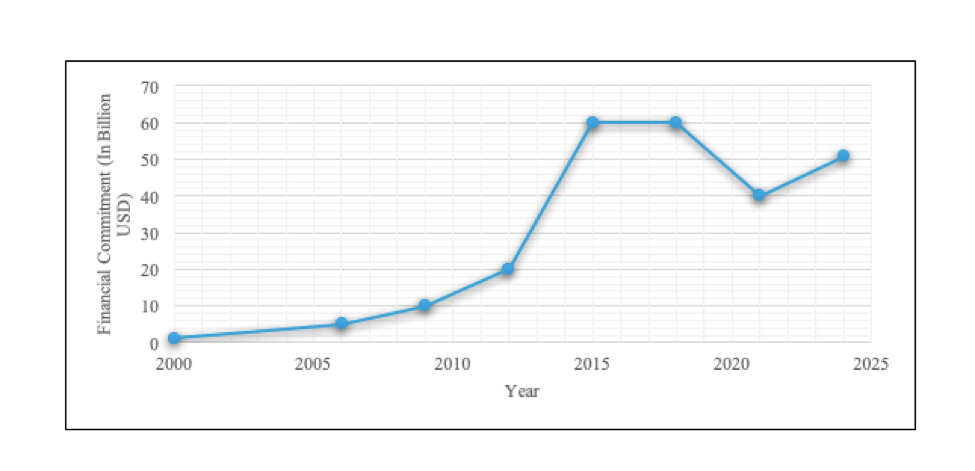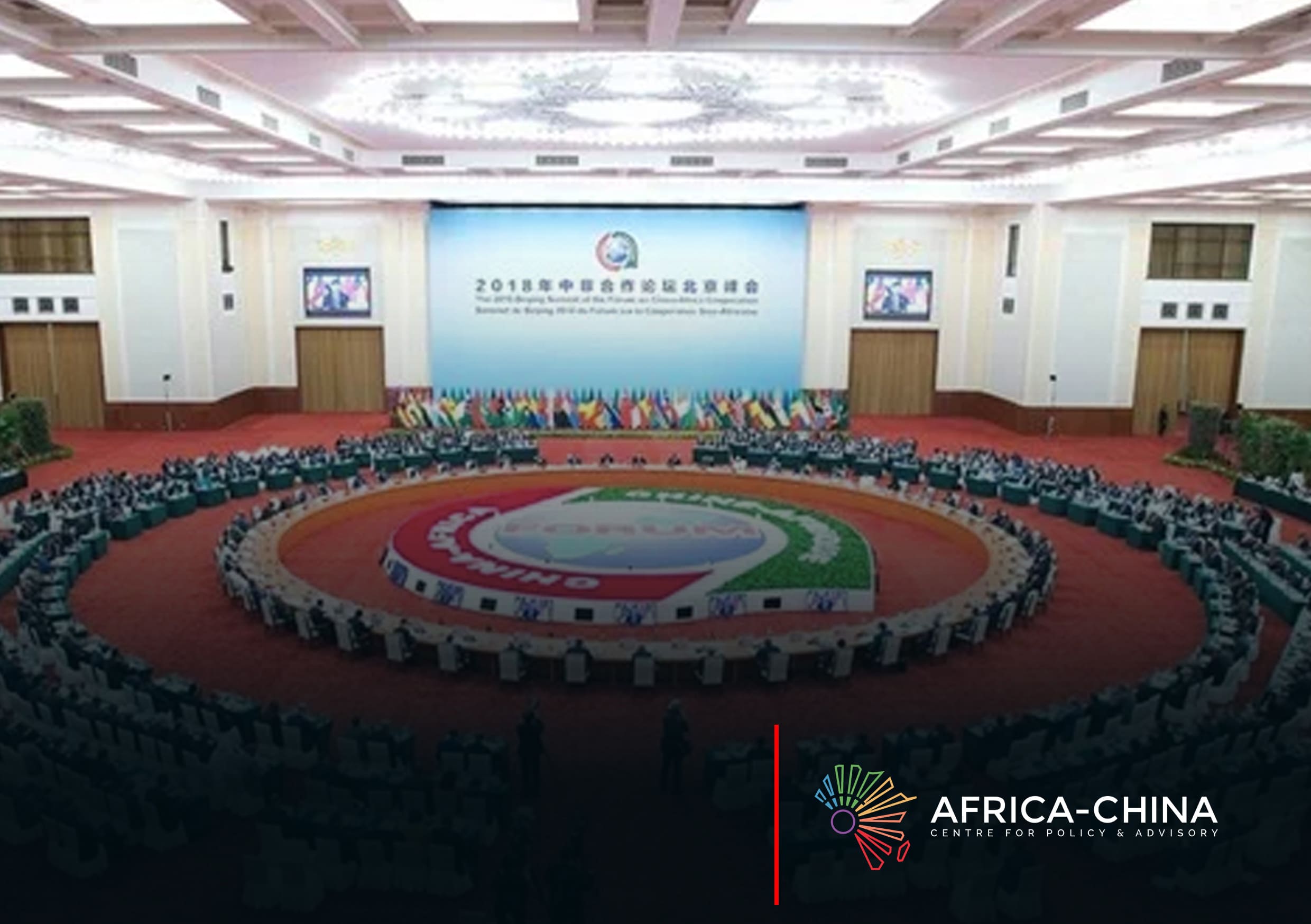Imagine a vast, sunlit plain in East Africa, where newly installed solar panels gleam across the horizon. Nearby, young technicians—trained just months before—are fine-tuning an electric vehicle charging station, while not far off, a digital hub hums with activity as local entrepreneurs connect to global markets through new 5G networks. While perhaps futuristic, this scene offers a glimpse into the transformation now taking shape in Africa, catalyzed by the 2024 Forum on China-Africa Cooperation (FOCAC).
A striking development to emerge from FOCAC 2024 is China’s commitment of $50.7 billion to Africa over the next three years. While impressive in scope, this pledge raises questions on intent and direction. In particular, is this a retreat from the grandeur of previous summits or a deliberate move toward more impactful development?
Following the Money: Trend of Financial Pledges
Since the inception of FOCAC in 2000, financial commitments to Africa have followed an upward trajectory (see graph). Starting from a modest $1 billion in 2000 the numbers soared to $60 billion in both 2015 and 2018, fuelling transformative infrastructure projects like railways, ports, and highways that have redefined Africa’s economic landscape.
The 2024 pledge of $50.7 billion appears modest compared to these peaks. Yet, the real story isn’t about scaling back. Rather, it is about focusing on localized projects that cater directly to the needs of Africans.

Trend of China’s Financial Pledges in FOCAC Summits
Gone are the days when the spotlight glowed solely on large-scale projects. This transition phenomenon signals a deeper understanding of Africa’s changing needs and reflects President Xi Jinping’s announcement of 1,000 “small yet beautiful” projects, a strategy that emphasizes smaller, more targeted projects tailored to local communities and sectors critical to sustainable development.
Worth Noting: Green Finance and Digital Connectivity
A significant portion of the financial package is aimed at supporting green development, reflecting the ambition to help Africa industrialize without compromising environmental sustainability. Key investments focus on renewable energy, circular economy initiatives, and green technology transfers.
Notably, the package also includes plans to launch 30 clean energy projects and promote electric vehicles, solar energy, and other technologies, all of which are set to shape the future of Africa’s industrial landscape while driving its green transition. Consider Ethiopia as a case study. With Chinese support, the country has already begun transitioning to greener manufacturing, launching its first eco-friendly industrial park in 2023 powered entirely by renewable energy.
The FOCAC 2024 pledge, by enhancing green finance, can replicate such models across the continent, contributing to job creation and sustainable economic growth. In addition to green finance is investment in vocational training and digital skills development. The aim is to equip Africa’s increasing youth population with the skills needed to compete in the global marketplace. A centerpiece of this new approach is the creation of 20 digital infrastructure projects, including 5G networks and e-commerce platforms, underscoring the commitment to building a modern Africa that’s both digitally connected and economically resilient.
Tackling Financial sustainability uncertainty
While the 2024 FOCAC summit introduced ambitious projects, skepticism lingers regarding the sustainability of China’s financial commitments to Africa. Critics have voiced concerns about Africa’s rising debt owed to Chinese lenders. According to a 2023 World Bank report, nearly 21% of Africa’s total external debt is owed to China, raising questions about whether additional financial pledges will exacerbate the continent’s already heavy debt load.
However, there is mounting evidence that both Africa and China are recalibrating their approach to financing development. During the summit, China emphasized that much of the $50.7 billion pledge would come in the form of grants and concessional loans rather than high-interest debt1.
Additionally, there was a strong focus on debt restructuring mechanisms, with China offering to renegotiate existing loans for countries struggling to meet their repayment obligations2. These moves reflect a more cautious and pragmatic approach to development finance, one that seeks to alleviate rather than compound Africa’s debt challenges.
Africa’s Growing Agency and A New Era of Relations with China
Beyond the financial commitments, the 2024 FOCAC summit also sparked discussions about Africa’s increasing agency in its relationship with China. Unlike previous summits where China took the lead in setting the agenda, this year’s forum saw a more balanced dynamic, with African leaders pushing for greater control over how investments are allocated and used.
Many African nations are now prioritizing projects that align with their national development goals, such as boosting local manufacturing, enhancing food security, and addressing youth unemployment. Ghana, for instance, successfully negotiated a partnership with China to invest in its agricultural sector, particularly in agro-processing and food security initiatives.
This evolving dynamic also highlights China’s recognition that Africa is not a monolith, and its development needs vary across regions. In an unprecedented move, Chinese embassies convened selected think tanks and experts in their respective countries before the 2024 FOCAC to gather insights and discuss tailored strategies.
This speaks volumes about the depth of China’s commitment to understanding the unique needs of each African country, ensuring that its investments are not just well-intentioned but well-informed. Such discussions highlight the nuanced, thoughtful approach China is taking—recognizing that one-size-fits-all solutions are a thing of the past.
Conclusion
Indeed, the 2024 FOCAC summit reflects a new chapter in Africa-China relations. The $50.7 billion pledge by China is not simply a dollar amount but a strategic commitment to redefine China-Africa collaboration.
It asks a critical question: How do we make development not only visible but also inclusive and transformative? By channeling funds into renewable energy, digitalization, and skills development, China has indicated that it values the future resilience and autonomy of African nations over immediate grandeur.
If successful, the projects stemming from FOCAC 2024 could provide a template for development in the Global South—a blend of financial aid, technology transfer, local capacity building, and sustainability. The emphasis on smaller, community-centered projects might just answer the $50.7 billion question: The era of transformative, people-first cooperation between China and Africa has begun.
Written by: Isaac Ankrah, PhD., Senior Research Fellow, ACCPA





